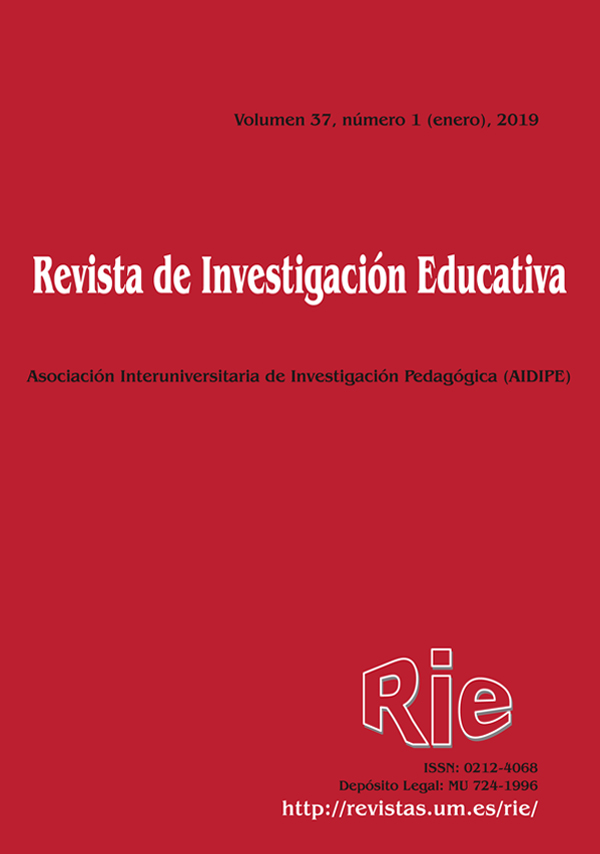Estados emocionales contrapuestos como predictores del rendimiento académico en secundaria
Abstract
This work has as main objective to analyze the predictors of Anxiety, Happiness and Academic Achievement, according to age, gender, culture and socioeconomic stratum as well as the relationships that could be given between all the variables, for a multicultural adolescent sample. To make it possible we focused on 811 participants from six educational centre; 71.6% of the total were Muslims and 28.4% belonged to the Christian religion, 46.1% were male and 53.9% female. The techniques used in this survey were the State-Trait Anxiety Inventory for Children (STAIC, Spielberger, 2001), a Happiness questionnaire, as well as the students’ grades. The results reflect that the predictors of Anxiety are Age and Gender. For Happiness, all the sociodemographics variables act as predictors: They are Age, Culture, Socioeconomic stratum and Gender. We found a strong and inverse relationship between Anxiety and Happiness. Each one act as the main predictor of the other. Academic Achievement predictors’ are the sociodemographic factors of status, culture and age. There is no statistically significant relationship between Anxiety and Academic Achievement, but we found it between Academic Achievement and Happiness.
Downloads
-
Abstract3116
-
PDF (Español (España))2458
References
Alonso, J., & Román, J. M. (2014). Nivel sociocultural, prácticas educativas familiares y autoestima de los hijos en edades tempranas. Revista de Investigación Educativa, 32(1), 187-202. https://doi.org/10.6018/rie.32.1.173421
Caballero-Dominguez, C. C., Suárez-Colorado, Y. P., & Bruges-Carbonó, H. D. (2015). Characteristics of Emotional Intelligence in a Group of Higher Education Students with and without Suicidal Ideation. Revista CES Psicología, 8(2), 138-155. https://dialnet.unirioja.es/servlet/articulo?codigo=5236645
Carballeira, M., González, J. A., & Marrero, R. J. (2015). Diferencias transculturales en bienestar subjetivo: México y España. Anales de Psicología, 31(1), 199-206. http://dx.doi.org10.6018/analesps.31.1.166931
Cervini, R., Dari, N., & Quiroz, S. (2014). Estructura familiar y Rendimiento Académico en países de América Latina. Los datos del Segundo Estudio Regional Comparativo y Explicativo. Revista Mexicana de Investigación Educativa, 19(61), 569-597. http://www.redalyc.org/articulo.oa?id=14030110010
Contreras, F., Espinosa, J. C., Esguerra, G., Haikal, A., & Rodríguez, A. (2005). Autoeficacia, ansiedad y rendimiento académico en adolescentes. Perspectivas en psicología 1(2), 183-194. http://www.redalyc.org/articulo.oa?id=67910207
Díaz, F., & González, M. J. (2011). Subjective and Occupational Well-Being in a Sample of Mexican Workers. Social Indicators Research, 100(2), 273-285.
Fillo, J., Simpson, J. A., Rholes, W. S., & Kohn, J. L. (2015). Dads doing diapers: Indivi- dual and relational outcomes associated with the division of child care across the transition to parenthood. Journal of Personality and Social Psychology, 108, 298-316. http://dx.doi.org//10.1037/a0038572
Franco, N., Pérez, M. A., & de Dios, M. J. (2014). Relación entre los estilos de crianza parental y el desarrollo de ansiedad y conductas disruptivas en niños de 3 a 6 años. Revista de Psicología Clínica con Niños y Adolescentes, 1(2), 149-156. https://dialnet.unirioja.es/servlet/articulo?codigo=4742071
Gómez-Castro, J. L. (1986). “Rendimiento escolar y valores interpersonales: Análisis de resultados en E.G.B. con el cuestionario SIV de Leonardo V. Gordon”. Bordón, 262, 257-275.
Gómez-Garibello, C., & Chaux, E. (2014). Agresión relacional en preescolar: variables cognoscitivas y emocionales asociadas. Universitas Psychologica, 13(2), 565-574. http://dx.doi/org/10.11144/Javeriana.UPSY13-2.arpv
Inglés, C. J., La Greca, A. M., Marzo, J. C., García-López, L. J., & García-Fernández,J. M. (2010). Social Anxiety Scale for Adolescents: factorial invariance and latent mean differences across gender and age in Spanish adolescents. Journal of Anxiety Disorders, 24, 847-855. http://dx.doi.org/10.1016/j.janxdis.2010.06.007
Jia, Z., Tian, W., He, X., Liu, W., Jin, C., & Ding, H. (2010). Mental health and quality of life survey among child survivors of the 2008 Sichuan earthquake. Quality of Life Research, 19, 1381-1391. http://dx.doi.org/10.1007/s11136-010-9703-8.
Lawrence, E., Rothman, A. D., Cobb, R. J., & Bradbury, T. N. (2012). Marital satisfaction across the transition to parenthood: Three eras of research. Washington, DC: American Psychological Association.
Matijasevic, M. T., Ramírez, M., & Villada, C. (2010). Bienestar subjetivo: Una revisión crítica de sus resultados, alcances y limitaciones. Regiones, 5(1), 5-39.
Moreno-Rosset, C., Arnal-Remón, B., Antequera-Jurado, R., & Ramírez-Uclés, I. (2016). Anxiety and psychological wellbeing in couples in transition to parenthood. Clínica y Salud, 27, 29–35. http://dx.doi.org/10.1016/j.clysa.2016.01.004
The articles and scientific documents published in RIE abide the following conditions:
1. The Servicio de Publicaciones de la Universidad de Murcia (the publisher) has the property rights (copyright) of all the documents published and allows the reuse under the user’s license indicated in point 2.
2. All documents are published in the digital edition of RIE under a Creative Commons Reconocimiento-NoComercial-SinObraDerivada 4.0 Internacional. (legal document) license. These documents can be copied, used, distributed, communicated and explained publicly if: i) the author(s) and its original source of publishing (magazine, publisher and URL of the document) are cited; ii) it is not used for commercial purpose; iii) the existence and the specifications about this license are mentioned.
3. Auto-archive’s conditions. The authors are allowed and encouraged to digitally distribute the pre-print versions (a version before evaluation) and/or post-print (a version that it is already evaluated and accepted to its publication). This promotes circulation and distribution earlier and can increase the citations and significance within the academic community.










